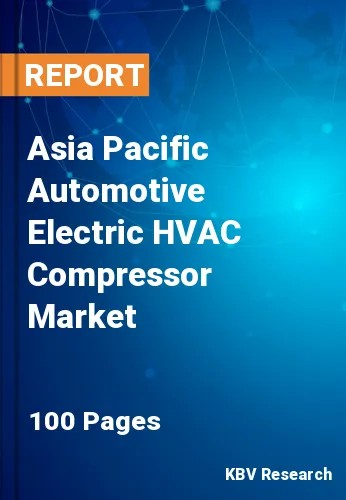The Asia Pacific Automotive Electric HVAC Compressor Market would witness market growth of 19.9% CAGR during the forecast period (2021-2027).
The air conditioning system is responsible for 20% of the complete energy consumption of a vehicle and therefore impacts the acceleration and range of the vehicle, among other aspects. An electric compressor can decrease this ratio, hence assisting in enhancing the overall range and productivity of electric vehicles. Electric compressors are integrated with in-built revolution speed control, which can be changed in order to decrease energy consumption. Electric compressors offer high performance at low revolutions while also increasing the life of the lithium-ion battery. The energy preserved can be utilized to enhance the range of the vehicle.
Though, the hermetic construction of an electric compressor assists in making sure that there should be no leakage in refrigerant and reacts with the air outside. Though, maintenance is equally important for electric compressors. The electric compressors and air conditioning systems of electric vehicles continue to evolve according to technological advancement. Due to this, future systems may be made with a unique approach to create the compressors compact and feature predictive control functions to enhance energy efficiency. Expecting these new systems to materialize, workshops, and owners would also have to consistently enhance their expertise in maintaining electric compressors of the future.
Asia Pacific emerged as a promising region in the global automotive electric HVAC market by obtaining a major revenue share of the market. Additionally, a constant surge in the sales of vehicles in various key nations of this region like India, China, South Korea, and Japan, has boosted the demand for automotive electric HVAC compressors. In addition to it, the automotive manufacturers operating in this region are enhancing their production in order to fulfil the local as well export demand for the vehicle, which as a result, would propel the regional automotive electric HVAC compressors market.
Moreover, increasing fuel prices in India are motivating individuals to choose electric and hybrid vehicles. These trends are converting into profitable growth opportunities for the players operating in the regional market. Compressors are becoming highly crucial in battery thermal management and improving range & maintenance of battery life, thereby accelerating the growth & demand of the market.
The China market dominated the Asia Pacific 40-60 CC Automotive Electric HVAC Compressor Market by Country 2020, thereby, achieving a market value of $1,084.1 million by 2027. The Japan market is showcasing a CAGR of 20% during (2021 - 2027). Additionally, The Taiwan market is anticipated to grow at a CAGR of 21.7% during (2021 - 2027).
Based on Vehicle Type, the market is segmented into Passenger Vehicle, Light Commercial Vehicle (LCV), Heavy Commercial Vehicle (HCV) and Others. Based on Drivetrain, the market is segmented into Hybrid Electric Vehicles (HEV), Plug-in Hybrid Electric Vehicles (PHEV) and Battery Electric Vehicles (BEV). Based on Cooling Capacity, the market is segmented into 20-40 CC, Less Than 20 CC, 40-60 CC and Others. Based on countries, the market is segmented into China, Japan, India, South Korea, Singapore, Taiwan, and Rest of Asia Pacific.
Free Valuable Insights: The Worldwide Automotive Electric HVAC Compressor Market is Projected to reach USD 30.4 Billion by 2027, at a CAGR of 19.4%
The market research report covers the analysis of key stake holders of the market. Key companies profiled in the report include Denso Corporation, Toyota Industries Corporation, Valeo SA, Aptiv PLC, Panasonic Corporation, Brose Fahrzeugteile SE & Co. KG, BorgWarner, Inc., Hanon Systems (Hahn & Co. Auto Holdings Co., Ltd.), Mahle GmbH (Mahle Stiftung GmbH), and Sanden Holdings Corporation.
By Vehicle Type
By Drivetrain
By Cooling Capacity
By Country
Our team of dedicated experts can provide you with attractive expansion opportunities for your business.

